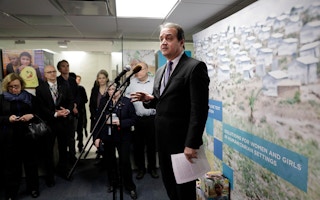As the world plans its economic recovery from the coronavirus pandemic, it faces a crossroads - turn towards a greener, more resilient future or tip into a carbon-heavy trap that fails to limit global warming, a top climate finance official said.
Yannick Glemarec, executive director of the multi-billion-dollar Green Climate Fund (GCF), said the jury was still out on which direction will be taken, as governments are still deciding stimulus spending.
“If we can succeed in greening the economic stimulus measures, we will be able to effect a major course correction - one of the greatest ones in history,” he told the Thomson Reuters Foundation in an interview.
But “the information so far should warn us against any kind of complacency”, he added.
He pointed to data from Energy Policy Tracker, a new tool by a coalition of research institutes and green groups analysing governments’ Covid-19 recovery announcements.
It shows G20 countries have promised policy support worth $161 billion for fossil fuel-heavy industries such as airlines, oil, coal and roadbuilding so far - 51 per cent of all public money committed to the energy sector. Clean energy accounts for 39 per cent.
Most governments are finding their budgets squeezed by the coronavirus crisis but the situation is toughest for many of the poorer developing nations the GCF works with.
“
We really need to make sure that all countries interested in exploring green economic stimulus measures can receive the technical assistance and financial support to do it.
Yannick Glemarec, executive director, Green Climate Fund
In its first five years, the GCF - set up to help vulnerable countries tackle climate change - has allocated $5.3 billion to 128 projects to cut planet-warming emissions and boost the resilience of more than 350 million people.
Glemarec noted those countries now face a dramatic drop in government revenue - from falling remittances, commodity prices and tourism - just as they need to spend more on social services, including healthcare.
Meanwhile, investors have pulled tens of billions of dollars from what they see as risky markets, leaving governments trying to work out how they can maintain their credit rating and access the funding they need to build a sustainable future, he added.
In response, the GCF is using an existing grant programme, which is helping nearly 140 countries get ready to receive climate finance, as a way to provide advice and extra money for them to also plan a green recovery from the pandemic.
“We really need to make sure that all countries interested in exploring green economic stimulus measures can receive the technical assistance and financial support to do it,” Glemarec noted.
Job creation
In terms of implementation, nearly all of the projects backed by GCF money are experiencing delays due to coronavirus-related restrictions, Glemarec said.
But the fund is working to help its partners overcome practical difficulties and re-plan as needed.
So far, the pressure on state budgets worldwide has not led any major donors to the fund - which include France, Britain, Germany and Japan - to back away from the fresh round of pledges they made last year, amounting to nearly $10 billion.
As a result of the coronavirus, Glemarec said the fund was seeing its partners - from UN agencies to banks and environmental groups - submit larger projects focused on areas that can quickly create jobs and boost economies.
They include deployment of renewable energy technology, electricity provision for villages and health centres, climate-resilient farming and nature-based solutions such as protection of forests and restoration of watersheds and mangroves.
The GCF secretariat is aiming to submit projects worth about $1 billion to its board for consideration at its next meeting from Aug. 18-21, which will be held by video conference - and keep up that level of approvals thereafter, Glemarec said.
The $10 billion or so the fund has in its coffers, if well invested upfront, can have a “major multiplier effect” if it attracts private capital, enables the creation of stable markets and shows that innovative projects and technologies can be a good bet, he said.
“We deeply believe that… climate action can both revive economies and create a lot of jobs in the short-term while ensuring that countries remain on a sustainable path - a low-emission, climate-resilient path in the long term,” he added.
This story was published with permission from Thomson Reuters Foundation, the charitable arm of Thomson Reuters, that covers humanitarian news, climate change, resilience, women’s rights, trafficking and property rights. Visit http://news.trust.org/climate.














